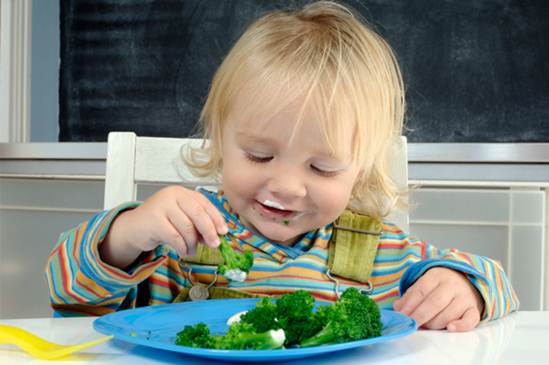At the age of 3, children may insist on eating the food you
make them to eat, but will choose one of the foods you offer them as they want
to be independent.
After the stage of weaning, children start eating more
foods, complete their abilities in motion and better their abilities in using
languages. This is the time children go to the kindergarten to enter a new
stage of their life. The big step needs monitoring and taking care of in order
to help babies to develop in the best way.

After the stage of
weaning, children start eating more foods, complete their abilities in motion
and better their abilities in using languages.
Children who are 3 years old have to experience many
changes. 90-93cm is the good height for children at the third year. After then,
they will get 0.5-1cm taller. By the time children are 4 years old, they should
be 1m tall according to the standard height.
3-year-old children weight about 14-14.5 kg. At the time,
children are slow in weight gaining, about 100-200g a month. If children don’t
gain weight successively in the next 2-3 months, you need to take them to the nutrition
specialists to have further counseling. On the other hand, if children gain
more than 500g each month and keep on doing that in later successive months,
you should consider the risk of obesity. By the time children are 4 years old,
they have gained 2 kg, which makes them weigh around 16-16.5kg.
Being on the stage, children are taken out more often than
they were in the kindergarten. Children start getting used to the outside
environment full of infectious factors; therefore, they often have fevers, snivel,
productive cough, diarrhea…. Since children in this age often get infected with
diseases, the risk of malnutrition is still waiting for its shot on your babies
when they have anorexia, don’t make up for the nutrients lost after the
recovery from a disease or when the disease dries out their energies and
nutrients they absorbed.

Children who are 3
years old and older are often more independent and stubborn in eating.
This is the time children try to prove themselves, and see
what they can and cannot do… You will witness your children become independent,
stubborn in imitating and taking part of most of adult’s activities. They will
become restive if you force them into eating food they don’t want to eat even
though their reasons for that are quite reasonless. Children simply do that
because they want to do just the opposite of what you ask them to do, want to
see your reactions for that and to attract more attentions, not mentioning the
case they have younger siblings who take all the attention.
Obese children at the age have higher changes of fast weight
gaining as they now they can decide to eat their favorite foods which could be
greasy meat, fried foods, cakes, coca cola… or ask their moms to make them
those foods, or go to the fridge and take food themselves… They can also spend
the whole day just sitting at one spot to play toys or watch cartoons.
Their eating is much similar to adults’ now as they can join
with other family members in the 3 main meals. You just need to provide them
with 4 groups of foods in every main meal. Additionally, children still need at
least 3 rations of milk, 200ml milk each, to develop height at their best; need
providing with protein, vitamins and minerals to support their activities.
If children have slow weight gaining, you can let them eat
energy-rich foods, fatty foods, sweets or add 1-2 spoons of cooking oil (soy
bean oil, refined sesame oil) in children’s foods. Let them drink fresh milk or
whole milk.
If children have fast increase in weight, you should take
notice of the foods you stored in the fridge, avoid storing much of chocolate,
confectioneries, cokes… Reduce greasy, sweet foods and increase the amount of
vegetables, tubers, fruits. Maintain providing children with milk to support
height development. Obese children had better drink skim and non-sugar milk.

Children who sleep
at 9-9h30pm have better increases in height than ones who sleep at 11-12hpm.
Allow children to choose foods with your guide. Children may
insist on eating the food you make them to eat, but will choose one of the
foods you offer them as they want to be independent. You should be friends with
your children and understand them; don’t force them. One important note is
children who sleep at 9-9h30pm have better increases in height than ones who
sleep at 11-12hpm.
If in a meal, children don’t like the food or finish their
rations, so don’t force them to eat more, but make it up by provide children
with cookies, fruits or half a glass of milk. It’s easier and children still
receive the nutrients they need.
One thing you should notice about is each child’s ration of
foods should include the 4 food groups: 2-3 spoons of minced protein foods
(meat, fish, shrimps, eggs, tofu, liver, pig brain….), 2 spoons of minced leafy
vegetables or tubers (water spinach, spinach, pumpkin, carrot…), 1-2 spoons of
cooking oil.